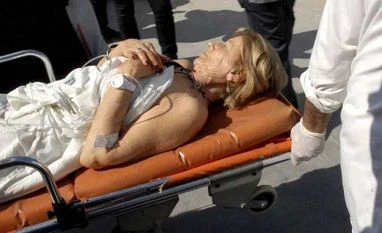Tunisian President Beji Caid Essebsi said security "failures" had helped facilitate the deadly attack on the country's national museum claimed by the Islamic State group that killed 20 foreign tourists.
"There were failures" which meant that "the police and intelligence were not systematic enough to ensure the safety of the museum", Essebsi told the Paris Match weekly in an interview published yesterday.
Twenty-one people, all but one of them foreign tourists, were killed when two gunmen stormed the National Bardo Museum in the capital Tunis on Wednesday.
Deputy speaker Abdelfattah Mourou had told AFP Friday that guards supposed to be protecting the museum and the nearby parliament were having coffee at the time of the assault.
The president's comments came as Tunisian authorities said there were developments in the investigation.
"There are developments in the case, but to protect the secrecy of the investigation we prefer not to provide any details," prosecution spokesman Sofiene Sliti told AFP.
However, Interior Minister Mohamed Ali Aroui said "more than 10 people have been arrested for direct or indirect involvement in the attack, among them people who provided logistical support".
He declined to say whether they included nine people already reported arrested, including the father, sister and two brothers of one of the gunmen police killed in the attack, Jabeur Khachnaoui.
The minister also said, without elaborating, that an arrest warrant had been issued for a Tunisian named Maher Ben Mouldi Kaidi for his suspected involvement in the attack.
A police source and acquaintance of Khachnaoui said the gunman's four relatives had now been freed, but Aroui would not confirm that.
On Wednesday, the two gunmen targeted tourists visiting the museum, killing 21 people, including a Tunisian policeman.
The dead tourists were four Italians, three Japanese, three French, two Spaniards, a Colombian, an Australian- Colombian, a British woman, a Belgian woman, three Poles and a Russian.
"There were failures" which meant that "the police and intelligence were not systematic enough to ensure the safety of the museum", Essebsi told the Paris Match weekly in an interview published yesterday.
Twenty-one people, all but one of them foreign tourists, were killed when two gunmen stormed the National Bardo Museum in the capital Tunis on Wednesday.
More From This Section
Essebsi however stressed that the security forces "responded very effectively to quickly put an end to the attack at the Bardo, certainly preventing dozens more deaths if the terrorists had been able to set off their suicide belts", he was quoted as saying on the Paris Match website.
Deputy speaker Abdelfattah Mourou had told AFP Friday that guards supposed to be protecting the museum and the nearby parliament were having coffee at the time of the assault.
The president's comments came as Tunisian authorities said there were developments in the investigation.
"There are developments in the case, but to protect the secrecy of the investigation we prefer not to provide any details," prosecution spokesman Sofiene Sliti told AFP.
However, Interior Minister Mohamed Ali Aroui said "more than 10 people have been arrested for direct or indirect involvement in the attack, among them people who provided logistical support".
He declined to say whether they included nine people already reported arrested, including the father, sister and two brothers of one of the gunmen police killed in the attack, Jabeur Khachnaoui.
The minister also said, without elaborating, that an arrest warrant had been issued for a Tunisian named Maher Ben Mouldi Kaidi for his suspected involvement in the attack.
A police source and acquaintance of Khachnaoui said the gunman's four relatives had now been freed, but Aroui would not confirm that.
On Wednesday, the two gunmen targeted tourists visiting the museum, killing 21 people, including a Tunisian policeman.
The dead tourists were four Italians, three Japanese, three French, two Spaniards, a Colombian, an Australian- Colombian, a British woman, a Belgian woman, three Poles and a Russian.
)